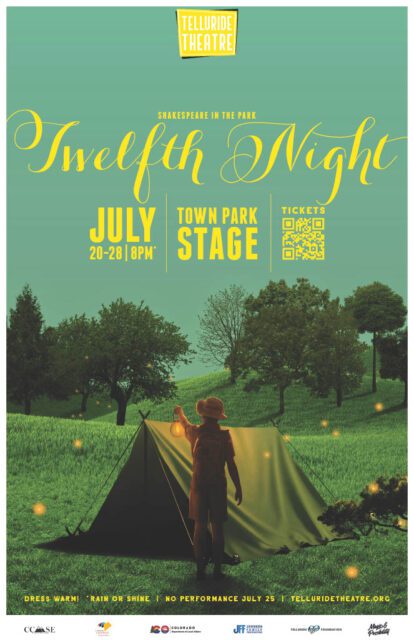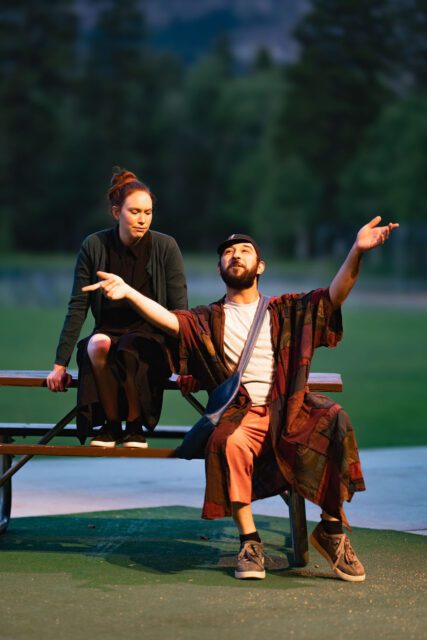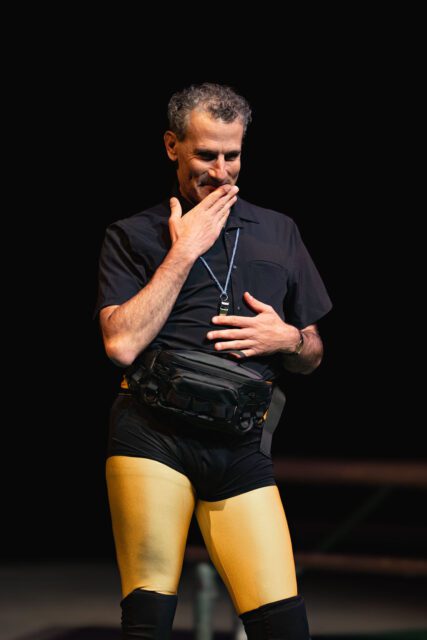
21 Jul Telluride Theatre’s “Twelfth Night”: Deliria and Hilaria at Camp Illyria, GO!
Telluride Theatre’s 34th annual Shakespeare in the Park production is “Twelfth Night” directed by James Cairl. “Twelfth Night” is a romantic comedy and one of the Bard’s most beloved plays. Adapted by Jen Wineman & Carter Gill.
July 20-28 at 8 p.m. (No show Thursday July 25).
$40 (adults); $20 (under 18). TICKETS available at www.telluridetheatre.org and FREE for all San Miguel County teachers and students* (*limited number of student/teacher tickets per night email info@telluridetheatre.org to claim.)
Rain or shine – audience is covered by Town Park stage. Please dress warm!
Go here for more about Telluride Theatre.

Preamble:
On a beautiful, balmy Friday night, sitting on the Main Stage in Town Park waiting for the dress rehearsal of Shakespeare’s “Twelfth Night” to start, watched a paraglider soaring overhead. Little did the guy know that for me he had morphed into a metaphor for Telluride’s Theater’s (TT) latest production, meaning the pilot flew high and smooth, but still managed to land solidly on his feet.
Plot synopsis:
The story of “Twelfth Night” starts with a shipwreck, which results in identical twins Viola and Sebastian getting separated, both believing the other died at sea. To survive in a foreign land, Viola disguises herself as a young man and, under the name of Cesario, gets a job as a servant for Duke Orsino. When Cesario meets Orsino, he is in love with Olivia, but she is in mourning for her dead brother, so has rejected all his advances. Orsino responds by sending his newly minted messenger with love letters to woo his intended on his behalf. Unfortunately, the Countess is taken by Cesario and falls in love with him instead.
The plot thickens as Viola secretly falls in love with Orsino, who is confused by his feelings for his new man-servant. So, Viola loves Orsino, Orsino loves Olivia and Olivia loves Cesario/Viola. Voila a comedic triangle.
Meanwhile back at her palace, Olivia’s butler, Malvolio, openly disapproves of all the other members of her household – her drunken aunt Lady Tobi Belch, Belch’s friend Sir Andrew Aguecheek and servants, Maria, Feste and Fabian. Fed up with Malvolio constantly spoiling their decadent (read drunken) fun, the ragtag group of dedicated losers decides to play a practical joke, tricking the lovesick stick-in-the-mud into believing his lust for Olivia is returned.
Shortly thereafter Viola’s brother, Sebastian, who believes his sister is dead, arrives with his friend and protector, Antonio, who had rescued him from the sinking ship.
Sebastian meets Olivia, who mistakes him for Cesario – remember, Viola and Sebastian are twins – and asks him to marry her. Sebastian agrees.
Mass mayhem ensues around the mistaken identity of Sebastian and Cesario, and exactly who is promised to whom. However, all’s well that ends well. Brother and sister are reunited and the love triangle resolves into two couples: Sebastian and Olivia; Viola and Orsino. And when Olivia discovers the trick that has been played on Malvolio, he is released from confinement, vowing revenge.
Amen and applause for this fun, funny and freewheeling farce about longing, love, mistaken identity, gender fluidity, role reversal and, well, all of life’s flotsam and jetsam – plus water.
Yes water.
Which segues naturally to the character of Feste, played to perfection by the witty, warm, engaging, tuneful Nikolas Pantovich-Gonzalez. In Olivia’s house, he is a servant and her jester, yet somehow Feste manages to slip out to spend time at Duke Orsino’s place and generally go wherever the mood takes him.
Cast/Commentary:
Pantovich-Gonzalez’s Feste is an observer – the wallflower at the party – who always seems to get what’s really going on among the folks at Camp Illyria. He knows what is happening between Cesario and Olivia, and likely notices the connection between Cesario and Orsino. He also knows Cesario is a woman (“Now Jove, in his next commodity of hair, send thee a beard!”).

Olivia,Ursula Ostander and Pantovich-Gonzalez as Feste. Credit Patrick Dyar.
Make sense then that director Jim Cairi turns the character into an omniscient “fool” and surrogate for the audience itself.
Which brings us full circle back to water and Feste’s last song in the production, “The Wind and The Rain.”
Water in the form of rain is an archetypal symbol for emotions because it mutable, transformative, and unpredictable as it ebbs and swells, trickles and pours. Rain is also inevitable, just part of the natural cycle of things like love lost and found.
When Feste sings that song with the cast at the close of the show, he reminds us that day-to-day, moment-to-moment, life is unpredictable. “The rain it raineth every day,” acknowledging that sh*t happens. The beauty of life is that we might drown in our love, but we can also choose not to go down with the ship. Rain then turns out to be cleansing, allowing us to grow, move on and start anew.
Now on to the other main characters and a question on the (picnic) table: Are the play’s protagonist Viola, the aristocratic Julia Caulfield, and Olivia, the other beautiful noblewoman and equally gifted actress, Ursula Ostrander, actually two sides of the same coin?
Yes and no.
Yes their names contain the exact same letters – in a different order – so the Bard is teasing us into thinking the two are variations on the same theme.
Yes, both have recently been orphaned and, to all outward appearances, have lost a brother and are therefore alone in the world.
But here the similarity ends.
Again, maybe …
Ostrander’s Olivia rather melodramatically indulges in her grief, dressing in black, pouting a lot and shutting herself into her palace. While Caulfield’s smart, steady, survivor, Viola, deeply grieves for her brother, she is still able to function to great effect in the world.
Yet the divergent behavior of these two women may or may not shut down the notion they are actually one and the same. Aren’t we all capable of reacting differently on different days to the same stimulus?
So, your call…
Regardless, Viola and Olivia are the Twin Towers of TT’s adaptation of the Bard’s comedy. They both flash different colors in their clearly articulated performances. In fact, in “Twelfth Night,” Ostrander represents the fluidity of identity as she changes from drama queen into a woman of grace and great intelligence. While Caulfield’s Viola, the show’s true north, effectively sets the direction of the production and is the catalyst for any and all major plots changes.
The confident, resonant Tom Shane is poor old Malvolio, one of Shakespeare’s great foils, a stern figure who sees fun as an annoyance at best, sinful at worst. In other words, the sanctimonious killjoy is used by the Bard to underline the fact sober moralists are easily turned into fools, so Shane/Malvolio becomes a prime, if prim, driver of the action. Everyone laughed out loud at his big stocking reveal moment and his overall masterclass in clowning.

Tom Shane as Malvolio in drag to please Olivia. Credit Clarke Dyer.
Jacob D. Harlem’s Orsino plays the rich, influential Duke as moody but determined. His spoiled, gloomy romantic is clearly vexed and bored when, as the Stones turned into a meme, he can’t always get what he wants.
Samuel Young plays Viola’s twin Sebastian as noble and capable of strong, deeply felt emotions – like his sister. His character is also a straight-shooter, the only lead who does not indulge in deception.
Miguel Ambriz is Antonio, often been described as “the gay pirate” of the show. After rescuing Sebastian from death at sea, his attachment to the man has evidently become so strong it appears romantic in nature. As Antonio explains: “His life I gave him and did thereto add / My love, without retention or restraint.” So Ambriz plays his part as steadfast and willing to give up time, money, even his safety to follow and protect Sebastian.
The supporting cast shines too, especially the carousers who infuriate Malvolio.

Sasha as Lady Tobi Belch, James Van Hooser as Fabian and Charlie Hodes as Sir Andrew Aguecheek. Credit, Patrick Dyar.
Sasha Cucciniello, also TT’s Artistic Director, generally sucks the limelight from any scene in any production she appears in. The girl can’t help it. In this adaptation of “Twelfth Night,” Lord Toby, Olivia’s vulgar uncle, becomes Lady Tobi Belch, whose crass double-entendres and sex jokes stand in sharp contrast to Shane/Malvolio’s puritanical nature.
One of Belch’s partners in crime is Sir Andrew Aquecheek, a fool of a knight on any night who fantasizes about marrying Olivia. The asinine fop is played by Charlie Hodes as a comic foil for all the other characters in pursuit of love. Their fight scene with Viola as Cesario is a show-stopper, easily one of the funniest moments of the evening.
James Van Hooser has not lost one ounce of his prodigious talent. As Fabian, the man manages to steal a scene simply by drinking a beer. You’ll see.
The lovely Calista Hattler is Maria, Olivia’s maid, but Belch clearly admires the young lady’s dark wit. When push comes to shoving Malvolio, Belch asks Maria to write the poisonous note that leads to the man’s unjust confinement.
Carl MacMahon plays a policeman and a priest. In that role, his character symbolizes the importance of social norms – which MacMahon pulls off with aplomb – and a wink. Not to mention lightning quick costumes changes, which are also very funny.
Summing up, TT’s cast is a joy to watch, playing off of one another to deliver a unified front.
Crew:
So how did director Jim Cairl pull off the winning production? How did he handle Telluride Theater’s agile adaptation (by Jen Wineman and Carter Gill)?
Short answer: simply, agilely, elegantly, with a sharp focus on only whatever he deemed essential to move the story along.
“… Unlike other Shakespeare comedies the lady (Viola) doesn’t have magic, nor the power of royalty, nor is she a fool who can win despite herself,” Cairi explains, continuing:
“Sometimes, we are dropped into a situation we did not expect, but still have to figure out a way to make it through. We have our jobs, our children, our lives. We joke about the weight of adulting, while rescheduling vacation time. We almost never control the action, but can only try to hold on and hopefully let time untie problem knots…”
So, though Illyria might be filled with silliness, parties, a lovelorn duke, and a particularly wise fool, Cairi makes it crystal clear that Viola is among the most modern of Shakespeare’s heroines: a woman who could be on the verge of a nervous breakdown, but chooses instead to keeping her sh..t together, ultimately triumphing.
Bottom line: Cairo made the wise choice to get out the Bard’s messages, including “Twelfth Night’s” many twists and turns, with a light, albeit firm touch. For him less is decidedly more – leaving room for more to be more when the action calls for over the top.
And more than just in the direction, “less” shows up as “more” across all production values: in costume and set design; lighting design; and sound design. The latter had the effect of transforming the show’s music into a 13th character – or at least clues about the characters.
Cucciniello, who designed the sound explains:
“Because the show is set at a summer camp we went for popular music both new and old. Much of being at camp is singing songs, discovering new music and reliving old music everyone loves. But we peppered in some nature sounds and bugle calls to complete the soundscape of the setting. Miguel Ambriz, who also plays Antonio, doubles as The Musician and brings his beautiful acoustic guitar skills to our production. The love/high court scenes are framed with acoustic guitar; the fool scenes have canned pop music to underline the fact of a nonstop party.”
Nonstop as in vintage “Animal House.”
Kelli Fox ‘s lighting design principally had two speeds: soft and hot. Hot when needed to put an exclamation point on a particular speech. Worked seamlessly.
Melissa Trn (also Telluride Theatre’s Producing Director) was “Twelfth Night’s set/costume designer. The picnic table she chose for a centerpiece of the show’s action becomes a place to eat, a platform for seduction, and a prison. Tree stumps stand in as seats. The simplicity of it all allows the actors to shine more brightly.
Not doubt Trn’s overall choice to follow Cairl’s lead and go minimal was the only right move given the glorious natural backdrop of Town Park and Telluride’s mountain majesties. After all, who paints better than Mother Nature? A super simple set means Her talent is on full peacock – and it cost TT nothing.
Hats off too to Stage Manager Charlotte Guest, who managed to herd all those hip cats and keep the action moving along at a clip.
In effect, Guest helped ensure the actors would take up residence in our consciousness, the goal of any good play.


Sorry, the comment form is closed at this time.